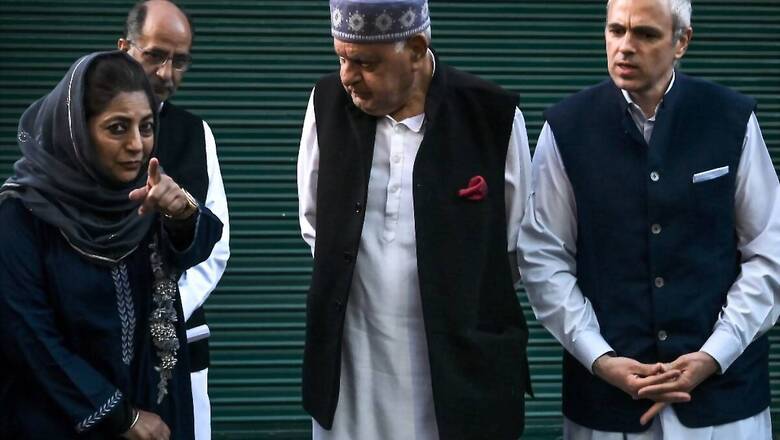'A New Low': As Centre Changes 7 Decades Old Land Laws in J&K, Local Parties, People Feel ‘Betrayed’

views
Srinagar: The Centre on Tuesday introduced fresh land laws and repealed some historic ones in Jammu and Kashmir that had given control of small tracks of land to poor and agriculturalists seven decades back. The fresh laws, called Union Territory of Jammu and Kashmir Reorganisation (Adaptation of Central Laws) Third Order, pave way for anyone in the country to buy non-agriculture land in the erstwhile state which was otherwise a reserve for residents of the J&K.
Article 35-A of J&K Constitution, taken down on August 5, 2019, had barred outsiders to buy land or take state government jobs.
Under one fresh notification, a senior army officer not less than the rank of Lieutenent General can write to government seeking to declare any area in J&K as ‘strategic in a local area’ for direct operational and training requirement of the armed forces.
The BJP government has also done away with the historic Big Land Estate Abolition Act, 1950 — under which the Sheikh Abdullah-led government, had distributed and shared land with the poor local tenants. Under the Act, huge landmasses were taken away to end landlordism in J&K.
The fresh order has fuelled suspicion among the people that government is gradually working to dispossess locals of their land and eventually disempower them. New orders issued on daily basis from Centre and Union Territory administration that vest power to executive in the absence of a legislature, are viewed critically on the ground.
The Ministry of Home Affairs (MHA) has revoked 11 state laws as a whole, while another 26 have been adapted with amendments. The laws which are repealed as a whole include the Jammu and Kashmir Alienation of Land Act, Jammu and Kashmir Big Landed Estates Abolition Act, Jammu and Kashmir Common Lands (Regulation) Act 1956, Jammu and Kashmir Consolidation of Holdings Act 1962, Jammu and Kashmir Right of Prior Purchase Act, and the Jammu and Kashmir Utilisation of Lands Act.
The People’s Alliance for Gupkar Declaration — an umbrella of seven mainstream parties that have pledged to fight for reversal of Article 370 — condemned the repeal of the J&K land laws equating it with stripping the permanent residents of erstwhile state of exclusive rights to acquire immovable property. Sajad Lone, its spokesman, called the MHA order a “huge betrayal and massive assault on the rights of the people”.
“The order made in exercise of powers under Reorgansation Act, 2019, is yet another brazen violation of the principal of constitutional propriety of the fundamental importance to the constitutional democracy,” he said.
Lone was dismayed at the abolition of the historic land to tiller Act. “The repeal of the Big Estates Abolition Act — the first ever agrarian reform in the subcontinent — is an insult to the sacrifices of thousands of freedom fighters and farmers who fought against autocratic and oppressive rule and a crude attempt to rewrite history.”
Former chief ministers Omar Abdullah and Mehbooba Mufti also said the move was unacceptable and aimed at disempowering the local residents.
Unacceptable amendments to the land ownership laws of J&K. Even the tokenism of domicile has been done away with when purchasing non-agricultural land & transfer of agricultural land has been made easier. J&K is now up for sale & the poorer small land holding owners will suffer.— Omar Abdullah (@OmarAbdullah) October 27, 2020
Yet another step thats part of GOI’s nefarious designs to disempower & disenfranchise people of J&K. From the unconstitutional scrapping of Article 370 to facilitating loot of our natural resources & finally putting land in J&K up for sale.— Mehbooba Mufti (@MehboobaMufti) October 27, 2020
The Big Land Estates Abolition Act
The Act was implemented in 1950 by Kashmir’s tallest leader Sheikh Abdullah under what was then called the Naya Kashmir programme. Under this law, local tenants were given land tracks on which they had toiled hard for decades for their landlords with very negligible returns. The Act placed a maximum ceiling of 22.75 acres on land holdings. Proprietors could, however, retain orchards and fuel and fodder reserves. Land exceeding this limit was automatically transferred to the tiller, who was not supposed to pay any compensation to the original owner. Consequently, more than 9,000 proprietors were divested of their excess land in J&K. All in all 790,000 landless peasants, mostly Muslims, were conferred with proprietary titles, including 250,000 lower caste Hindus in the Jammu region. Sheikh Abdullah enacted the Agrarian Reforms Act in 1976 to further rationalise land ownership in J&K.
The successive Dogra regimes had earlier distributed huge lands for Dogra Mian Rajputs to lure them to settle in Kashmir so that the maharaja’s clout could extend in Valley through his “own people”. Walter Lawrence, author of the book ‘The Valley of Kashmir’ and who was also first Settlement Commissioner of Kashmir during the later period of 19th century, has written extensively about the abysmal conditions of Muslim peasant and how land grants issued then were violated with impunity by the Dogra state’s revenue officials. Most of the landtracks were given to non-Muslims (Kashmiri Pandits and Dogras). However, the movement started by Sheikh Abdullah from the 1930s and onwards gave the rights of the “access’” land to the impoverished peasants.
With very limited space to protest given the current security situation, the residents are watching the new developments with shock and silence. The fresh order, they feel, seeks to strip them of their lands and to change the demography — the Muslim majority character — of the former state. People suspect the administration is gradually laying control over resources like the sand and quarry contracts besides aiming to displace the local industries and tourism players. This year a majority of sand contracts across Kashmir were bagged by non-locals and old contractors were left aggrieved.
“A new low, unsurprising though: comparing denial of rented places to Kashmiris outside to a systematic dispossession — of land and resources — of an entire people in Kashmir,” a resident tweeted on the new developments.
Even a Kashmiri Pandit body called the new land laws a betrayal. Satish Mahaldar, who heads Reconciliation, Return and Rehabilitation of Kashmiri Migrants said, “’I as a Kashmiri Pandit feel betrayed. I and my community today fear that our land has been snatched,” he said. “We condemn such an Act.”
Read all the Latest News and Breaking News here



















Comments
0 comment